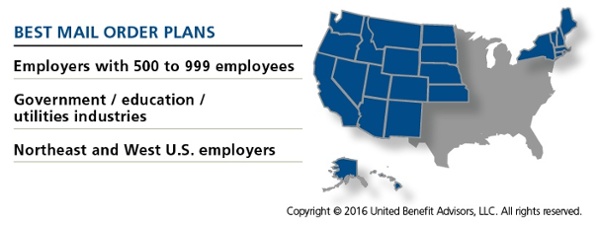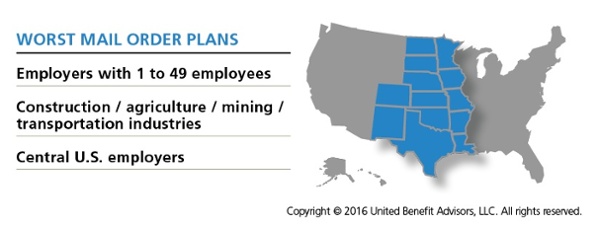By Mary Drueke-Collins, FSA
Vice President of Employee Benefits for Swartzbaugh-Farber & Associates, Inc.
A UBA Partner Firm
 Mail order has always been a convenient way for individuals to keep their maintenance drug prescriptions filled. Employers often wonder, are there other advantages to using mail order other than convenience? As an employer, should we be incentivizing mail order? The answers to some of these questions can be found in results from the latest UBA Health Plan Survey.
Mail order has always been a convenient way for individuals to keep their maintenance drug prescriptions filled. Employers often wonder, are there other advantages to using mail order other than convenience? As an employer, should we be incentivizing mail order? The answers to some of these questions can be found in results from the latest UBA Health Plan Survey.
Mail order can provide cost savings to both the employee and the employer. In the past, mail order provided much larger savings because it allowed for a 90-day supply, something not available through traditional retail settings. These days, however, more retail pharmacies are offering 90-day supplies, so the cost savings achieved by using mail order are slightly lower than they have been historically. We anticipate those savings will diminish even more as the costs of prescription drugs continue to increase.
Many employers pass on these savings to employees by requiring fewer copays when filling a prescription for 90 days via mail order. Unfortunately, not every employer has the luxury of incentivizing their employees to utilize mail order. Some states, like Nebraska, have laws that limit an employer’s ability to do so. These states prohibit fully insured plans from incentivizing mail order over retail, thus requiring individuals covered by a fully insured health plan to pay the same number of copays for a 90-day supply through the retail and mail order setting.
Those employers that are self-funded, or are not limited by state laws, have the ability to structure the copays of the mail order plan to encourage individuals to use mail order. According to the UBA Health Plan Survey, nationally 85% of employers that offer mail order require the individual to pay something other than three copays for a 90-day mail order supply. Nearly 39% of the respondents call for only one or two copayments for a 90-day mail order prescription.
As you look more closely at the data, you can see trends appearing by industry. Employers in educational services tend to provide the most incentive to utilize mail order, with only 4.6% of the plans needing three copayments for a 90-day supply, followed closely by the public administration and information industries.

Conversely, 34.4% of employers in the mining, oil and gas extraction industry required three copays or the least incentive to utilize mail order. The agriculture, forestry, fishing and wildlife plans were next in line with 20.3% of the plans of the survey had three copayments.

Even if there is no cost incentive to the covered individual, most employers still offer the opportunity for their employees to use mail order prescription services. In 2015, nationally only 4.9% of plans did not offer the mail order option. As you focus the data into industry groupings, you see 98.5% of employers responding to the survey that operate in the utilities industry offer mail order to their employees. The education services industry follows with 97.3% of the plans offering mail order services. On the other hand, just over 10% of the plans responding in both the agriculture, forestry, fishing and wildlife industry and management of companies and enterprises offered mail order as an option in the prescription drug plan.
Industry differences are likely due to the involvement of union negotiations, their employees’ access to retail pharmacies (or convenience of non-mail order facilities), and level of overall benefit richness. The utilities and educational industries have historically offered richer benefit plans, and allowing the covered participants a lower cost mail order option continues that trend.
As the prescription drug industry evolves, we anticipate the cost benefits of providing a mail order program will shrink and eventually the copay incentives we see now will diminish. Mail order will continue to be a more convenient method of filing prescriptions and may actually improve the health of individuals on maintenance drugs by keeping them compliant with their prescriptions. For now, if you are an employer wondering whether mail order is worth incentivizing, the answer is still primarily “Yes!”
For more information on prescription drug trends, subscribe to the UBA blog, read our breaking news release or download UBA’s free (no form!) publication: Special Report: Trends in Prescription Drug Benefits.
